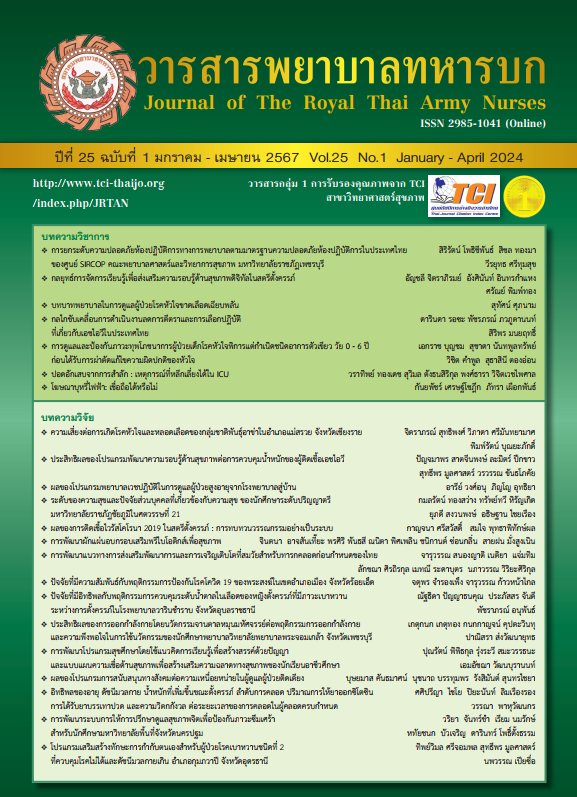A Confirmation Factor Analysis of Health Literacy for Child Caregivers
Keywords:
Health literacy, Confirmatory factor analysis, Child caregiversAbstract
The caring is the way to taking care of childhood to have good health includes physical, manental and intellectual health. Child caregivers must have health literacy about childhood care in order to development by aged and have proper health behaviors. The purpose of this survey study was to analyze component of caregiver’s health literacy in chid care centers. There were 240 of child caregivers. Data were collcted using nurturing care questionnaire. Content validity of the questionnaire was confirmed by 5 experts yielding the values each item ranged 0.8-1.0 and Reliability of the questionnaire was tested by Cronbach’s alpha coefficient yielding a values of .98. Data were analyzed using confirmation factor analysis.
The research results and confirmatory factor analysis revealed that health literacy of child caregivers in child care centers consisted of six main components: 1) communication skill, 2) health knowledge and understand, 3) media literacy, 4) self-management skill, 5) decision skill, and 6) accessing information and service. The health literacy components of child caregivers in child care centers was fit to the empirical data (χ2(2, N = 240) = 1.06, p = .59, CFI = 1.00, TLI = 1.00, RMSEA = .00, SRMR = .00) The data can be used to develop appropriate caregivers’ assessment tools and design the development of a system to care for child development centers more effectively.
Downloads
References
Royal Thai Government Gazette. National strategy (2018-2037). Royal Thai Government Gazette 2018; (in Thai)
Ponmark J, Thisara P, Weiangkham D, Duangpanya A. Development of a family participation model for Promoting Child development: A case study of Ban Sanpamuang child care center, mueang district, Phayao Province. Journal of Royal Thai Army Nurses. 2019; 20(2):241-50. (in Thai)
Department of local administration. The standard of child development centers of department of local administration fiscal year 2016. Bangkok: Department of local administration; 2016. (in Thai)
Nutbeam, D. The evolving concept of health literacy. Social Science & Medicine 2008; 67(12):2072-8.
Araujo MC, Dormal M, & Schady N. Childcare quality and child development. Journal of Human Resources 2019; 54(3):656-82.
Helmerhorst KO, Riksen-Walraven JMA, Fukkink RG, Tavecchio LW, Deynoot-Schaub MJG. Effects of the caregiver interaction profile training on caregiver–child interactions in Dutch child care centers: A randomized controlled trial. Child Youth Care Forum 2017; 46(3):413-36.
Department of health. Department of health annual report 2020. Bangkok: Aksorn Graphic and design publishing limited partnership; 2020. (in Thai)
Tinanoff N, Baez RJ, Diaz Guillory C, Donly KJ, Feldens CA, McGrat C, Songpaisan Y. Early childhood caries epidemiology, aetiology, risk assessment, societal burden, management, education, and policy: Global perspective. International Journal of Paediatric Dentistry 2019; 29(3):238-48.
Phattarasatjatum P, Nillapun M, Prachusilpa G, Vanichwatanavorachai S..Development of an integrated social media and technology based coaching model for developing early childhood healthcare competencies of caregivers in local administration organization childcare centers. Journal of Royal Thai Army Nurses. 2021; 22(3):123-34. (in Thai)
Lorpoolkijsakul P, Limpaseni W, Hemachusha O. Management guidelines for early childhood centers in Bangkok: A case study of Din Daend district. In B. Suwit et al (Ed.). Proceeding of Navamindradhiraj University Conference, Networking in the smart city: Collaboration of smart health and smart community 2018; Bangphlat, Bangkok. (in Thai)
Ponsawat R. Lifelong learning for promoting health literacy among the elderly in Thaisociety. Journal of the Royal Thai Army Nurses 2019; 20(3):54-61. (in Thai)
Kruthangka P. A Needs assessment for literacy in early childhood health care of child caregivers in child development centers. Nursing Journal CMU 2023; 50(1):329-42.
Fernandez-Jimenez R, Jaslow R, Bansilal S, Santana M, Diaz-Munoz R, Latina J, Kovacic JC. Child health promotion in underserved communities: The FAMILIA trial. Journal of the American College of Cardiology 2019; 73(16):2011-21.
Fields B, Rodakowski J, James AE, Beach S. Caregiver health literacy predicting healthcare communication and system navigation difficulty. Families Systems & Health 2018;36(4):482-92.
Edwards M, Wood F, Davies M, Edwards A. The development of health literacy in patients with a long-term health condition: The health literacy pathway model. BMC public health 2012; 12(1):130.
Soper DS. A-priori Sample Size Calculator for Structural Equation Models [Software] 2021.
Polit FD, Beck CL. Essentials of nursing research: Appraising evidence for nursing practice. 9th ed. India: Wolters Kluwer; 2017.
Manganello JA. Health literacy and adolescents: A framework and agenda for future research. Health Education Research 2008;23(5):840-7.
Jaruma B, Konnaimuang P. Methods for developing effective communication. Journal of MCU Humanities Review 2020; 6(1):413-28. (in Thai)
Choeisuwan V. Health literacy: Concept and application for nursing practice. Royal Thai Navy Medical Journal 2017;44(3):183-97. (in Thai)
Downloads
Published
How to Cite
Issue
Section
License
Copyright (c) 2024 Journal of The Royal Thai Army Nurses

This work is licensed under a Creative Commons Attribution-NonCommercial-NoDerivatives 4.0 International License.
บทความหรือข้อคิดเห็นใดใดที่ปรากฏในวารสารพยาบาลทหารบกเป็นวรรณกรรมของผู้เขียน ซึ่งบรรณาธิการหรือสมาคมพยาบาลทหารบก ไม่จำเป็นต้องเห็นด้วย
บทความที่ได้รับการตีพิมพ์เป็นลิขสิทธิ์ของวารสารพยาบาลทหารบก
The ideas and opinions expressed in the Journal of The Royal Thai Army Nurses are those of the authors and not necessarily those
of the editor or Royal Thai Army Nurses Association.






